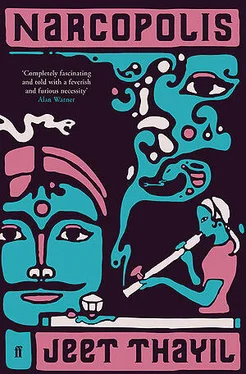*
The movie had a tremendous effect on Rashid, though he’d seen it many times. He didn’t speak until they were in a cab heading back to Shuklaji Street. Number eight, he told her, holding up seven fingers. And I’ll see it again. This is the movie that got me into drugs. This is why I opened my first adda and became a hippie. The only thing I can’t stand is that Dev Anand. He wouldn’t last three minutes on Shuklaji Street. Then he sang the song so forcefully that the melody lost its haunting quality and became an anthem. He lingered on the chorus, on its famous first couplet,
Dum maro dum,
Mit jaaye hum.
Bolo subah sham.
But there he stopped. He would not sing the final line, ‘Hare Krishna, Hare Ram’. It was too Hindu for him. Instead, thinking about dinner, he sang the verse again, changing the words.
Dum aloo dum,
Mit jaaye hum.
Bolo subah sham,
Dum aloo dum.
Chapter Six Stinking Asafoetida
When he started the car again he was feeling better, a miracle actually, the way his mood lifted, Rumi told Dimple. He drove towards Khar with ‘Machine Gun’ turned up loud, the smack kicking in like Buddy Miles’s big bass drum, never mind the shitty car’s shitty speakers; and the feedback and weird radio interference, some kind of helicopter noise, GIs in Vietnam maybe, then Jimi again, doing his voodoo shit, the spaces between notes liquefied into scratchy slow-mo sound grabs, the guitar loud, beyond loud, like a car crash in slow motion, metal and flesh fused: gave him the shivers every time, made him want to crash the car, or drink till he died, or tattoo a motto on his chest with a rusty nail and industrial dye, Kill You Quick . And that, said Rumi, was when he saw the woman. She was standing at the turn from Khar Dhanda to the main Juhu Road. She turned into the headlights when she heard the car slow. Her dark skin was scarred with old smallpox and her hair was held in place with pins and she carried one of those striped shopping bags, like a housewife. She was looking right at him. He stopped the car and she put her head at the window. He saw a bunch of keys on an ornate silver ring hooked to the waist of her sari. Maybe she really was a housewife, doing some quick freelance on the side to supplement the family income. Should I get in? she said. He fixed the price and drove until he found a street that was dark enough and then he parked between two cars, backed into the space and turned the engine off. He told her to move to the back seat and climbed in beside her, already conscious of her stink, what was it, garlic? Asafoetida? She’d been cooking recently and she had a powerful body odour, which excited him. She smelled of food and sweat and faintly of cologne and she was rubbing two fingers against her thumb. He dug into his jeans and gave her a hundred-rupee note, telling her to use her mouth on him. She gave him a look, like she didn’t do that, like she was out on the street selling sex but only on her terms. No water in my mouth, okay? she said, and her voice was pure business: she could have been a hooker on Shuklaji Street. And when she’d been at it for a while, head bouncing like a toy, a spray of bobby pins holding the hair in place above her ears, and he maybe nodded off a little, a tiny teeny little bit, she goes, You slept off or what? Then she muttered something in Bambayya Hindi that he didn’t catch and she started to gather her things. Finish, he told her, his voice loud in the small car. She put her shopping bag down and shot him a look and went back to work. He was half erect, when all of a sudden she stopped. Her jaws hurt, she said. She asked him to fuck her, which he did, reluctantly, because this was not part of the deal: fucking was work. He slapped her lightly and she moaned. She liked it; she fucked him back. Then he hit her again. She grabbed his hand and he punched her on the head, fucking her hard, and when he came, for the first time in weeks, he did what he always did, he screamed words he didn’t know and by now she was screaming too, in fear, and so, to shut her up, he hit her in the mouth, drawing blood, and the sight of it pushed him over and he came again. He pulled out, still dripping, and opened the door. She was moaning but unconscious. He put her on the ground by an abandoned handcart, small piles of shit nearby, human, by the smell of it, and as an afterthought, he put his hand into her blouse, realizing that he hadn’t touched her breasts until then, a pity, because they were swollen and wet at the nipples. He fondled her briefly and took the wad of notes folded into the whore’s bra and drove away as slowly as he could.
And this was when Dimple tried not to show her surprise. She said You should have asked me. I have a friend who would have given you much better service.
*
Rumi told her he drove home after his adventure with the housewife hooker, and walked in the door to a full-scale family celebration, his wife’s relatives, wandering around the house half naked. First thing they do, these people, walk in the door and take off their clothes because of the heat, which wasn’t any worse than usual. There were five of them, a man in shorts and no shirt, his wife, fully dressed, unfortunately, two small half-naked children, and an older woman, stopping by on their way home to Ahmedabad. Rumi sat on a couch in the front room, flipping through a magazine while the travellers repacked their bags and made phone calls. The older woman was bragging about her son’s new car. He caught the word Maruti, as he was meant to. And in case he didn’t, she repeated it for him in English. Darshan bought a new car, she said, Maruti, such a nice car. His partner bought a new model Ambassador, but Maruti’s mileage is better. At least Darshan had the sense to be embarrassed by his mother’s propaganda: he looked shamefaced. Just then the older child came in from the kitchen. He wore only underwear and he made a low whooo sound as he ran across the room. At the last moment, just as he was about to crash into the couch, he made a sharp turn into a new flight path parallel with the wall; his whoop became higher pitched. The other child staggered around the room like an old drunk, bumping into furniture and babbling with happiness. An instant later her face crumpled and there was a long exhalation. She stopped breathing. Her arms hung by her side and only her feet moved, in rhythm, walking in place. There was silence for a long excruciating moment, everyone waiting for the child to breathe. Then: a telescoping wail so loud it shook Rumi out of his half nod. Here, Rumi digressed for a moment. He told Dimple that childhood was a kind of affliction, certainly physical and possibly mental. Children were at a hopeless disadvantage; they were unsuited for the world. They were short and ungainly and stupid, half-people, dwarf bundles of ectoplasm and shit, stunted organisms incapable of finding food or keeping their asses clean. They needed constant attention and they couldn’t communicate their needs. All they could do was wait for it to pass, years of waiting until the blight was gone. It would make anybody bawl for no reason, he said. Soon, he heard his wife ask her cousin about his business. Her cousin and his partner had set up the company eight years earlier to provide technical support for office computer networks. It hadn’t begun well, had begun so badly in fact that they thought of packing it in. Then the economy opened up and they started to get orders from all over the place, and now there was so much business he’d bought his mother an apartment. Everybody, it seemed to Rumi, was making money except for him. After her relatives left, his wife went to sleep. Rumi thought of the time immediately after his return from LA, when he had a job in advertising and was earning better, and his wife was the one who had initiated sex. She’d been insatiable; it was all they did. He’d come home from work and she would pull him into the bedroom first thing. It was hard to believe this was the same woman. If he were bringing more money home, would it make a difference? Of course it would, he was sure of it. Her manner had changed almost to the month and day that he’d lost the job at the agency and taken up employment at her father’s brokerage. In that case, if money was the lubricant that made her agree to sex, what was the difference between her and the woman he’d paid earlier in the evening? If there was a difference, it was the prostitute who came out of it in a better light. At least she was true to her profession and her station in life. His wife was true to neither. If she were, she would understand that her duty was to serve him and make him happy. He was her pati, her husband and lord, and his happiness was her need. This is what he thought about as he lay beside his sleeping wife, Rumi told Dimple, and it gave him pleasure to remember the adventure with the prostitute, to relive it while his wife lay beside him and to smell again the street woman’s kitchen sweat. He sniffed his hands and smiled in the dark.
Читать дальше












